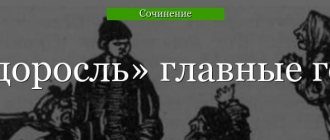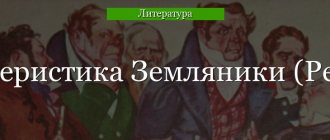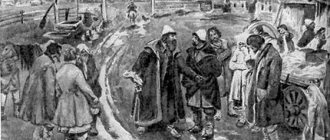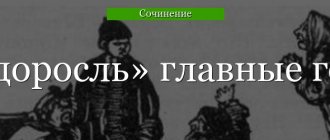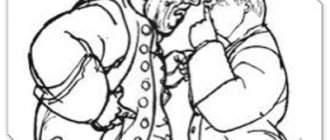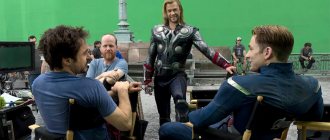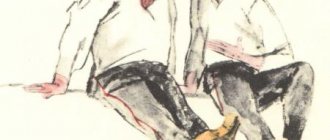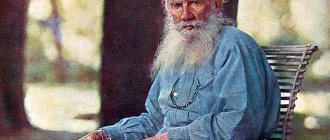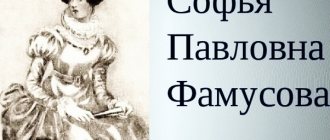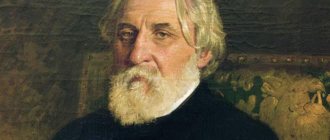One of the key characters in D. I. Fonvizin’s comedy “The Minor” is the venerable nobleman Starodum, Sophia’s uncle. This is a positive hero who advocates compliance with the “old” Peter the Great order, in which the person himself, his personal qualities, and not wealth, connections and position in society were valued above all else. He is the main antagonist of the landowner Prostakova, who personifies all the ignorance and cruelty of the era. Starodum’s characterization is distinguished by its completeness, and in many ways is a reflection of the author’s position. The hero talks a lot on moral topics, condemning ignorant, dark, immoral people, whose life principles can cause the degradation of the entire society.
The material was prepared jointly with a teacher of the highest category, Kuchmina Nadezhda Vladimirovna.
Experience as a teacher of Russian language and literature - 27 years.
a brief description of
Before reading this analysis, we recommend that you familiarize yourself with the work Nedorosl itself.
The full name is not specified, only the surname is known - Starodum.
Age - 60 years.
Occupation : nobleman, former courtier.
Family - the only close relative is her niece Sophia.
Social status : nobleman.
Origin - comes from a noble family.
The upbringing is typical for noble families, the concept of honor is instilled.
Education is insufficient education, in his opinion, so he spends his entire life educating himself.
Appearance - not specified.
Character - independent, principled, deeply decent, has ideas about honor and conscience.
Positive traits - honest, kind, merciful, responsible, highly valuing education and morality.
Negative traits - in his youth - quick-tempered, hot-tempered, touchy, but with age he became wiser.
The work is “Undergrowth”.
Author : Denis Ivanovich Fonvizin.
Premiere of the play
In the play “The Minor,” Fonvizin conveyed his personal idea of “honest people” and observations of what they should be like in their living personification. And therefore the image of Starodum is not accidental here. The production of "The Minor" was delayed for some time for obvious reasons. “Evil” arrows rained down overnight, with the help of which those individuals who saw themselves in an impartial form in the play wanted to prevent its release. And, apparently, Fonvizin himself had to resort to influential patrons to remove all obstacles.
In 1782, on September 24, the premiere of the play nevertheless took place on the stage of the St. Petersburg Free Russian Theater. The director himself was the author of the work. And, curiously, not a single syllable had to be changed in the play, so the success was deafening.
One of those who saw the premiere said that some comic scenes caused fleeting laughter, but the serious scenes were listened to with great thirst and attention by the entire secular public, who at that time loved hints and comments on secular weakness and the savagery of some customs of that time. The play, thanks to the liveliness of the dialogue, humor, aphorisms, interesting quotes and educational character, helped some to see the Prostakovs in themselves, who then expelled false teachers like Vralman and Tsyfirkin from their homes.
Quote characteristic
A description of the hero with quotes will allow you to reveal his image, demonstrate not only his appearance, but also character traits, behavioral characteristics, and attitude to life.
Portrait
The artistic portrait of Starodum is based on the fact that he is a nobleman, coming from an old aristocratic family. His father served at the court of Peter the Great himself and was not only a courtier, but also served in the military.
“Let’s immediately join the army and become worthy of the title of nobleman that our breed gave us.”
Source: Act Three, Scene 1
“Starodum. ...He served Peter the Great... My father is at the court of Peter the Great...
Pravdin. And I heard that he is in military service...
Starodum. In that century, courtiers were warriors, but warriors were not courtiers.” (Act three, scene 1)
Starodum himself served in military service in his youth.
“Entered military service...” (Act three, scene 1)
The portrait description of Starodum is based on the fact that he is a venerable, respected man of advanced age.
“I’m dying, I want to see this venerable old man .” (Act two, phenomenon 5)
“I myself have the honor of knowing your uncle. And besides, I heard things about him from many that instilled true respect for him in my soul.” (Act two, phenomenon 5)
Starodum is the only close relative of the orphan Sophia, her uncle. He loves the girl with all his heart and takes on the role of her father.
"Her uncle." (Act one, phenomenon 5)
“Uncle, about whom we knew nothing for so long, whom I love and honor as my father ...”
Source: Act one, scene 6
“You are the daughter of my sister, the daughter of my heart!”
Source: Act Three, Scene 2
“You know that I am tied to life only by you. You must provide comfort to my old age, and my care is your happiness.”
Source: Act Three, Scene 2
Starodum was forced to leave his sister and Sophia and go to Siberia to provide his niece with a decent dowry.
“By retiring, I laid the foundation for your upbringing, but I could not establish your fortune otherwise than by separation from your mother and you.”
Source: Act Three, Scene 2
“In order to protect her life from a lack of what she needed, I decided to retire for several years to the land where money is obtained, without exchanging it for conscience , without vile service, without robbing the fatherland; where they demand money from the land itself, which is more just than people, does not know partiality, but pays only for labor faithfully and generously.”
Source: Act Three, Scene 2
“I take the place of your father. Trust me that I know his rights."
Source: Act Three, Scene 5
Many believed that Starodum was dead, since nothing had been heard about him for many years.
“Her uncle, Mr. Starodum, went to Siberia; and since there has been no rumor or news about him , we consider him dead.”
Source: Act one, scene 5
After a long separation, Starodum appears unexpectedly for everyone. He spent all this time in Siberia, where he earned a fortune through honest labor.
“My affairs forced me to live for several years in separation from my neighbors; and the distance deprived me of the pleasure of hearing from you! I’m now in Moscow, having lived in Siberia for several years.”
Source: Act one, scene 5
Appearance
Starodum's appearance is based on the fact that he is an elderly man. He is 60 years old.
"...this venerable old man."
Source: Act two, scene 5
“I am sixty years old in the world.”
Source: Act Three, Scene 2
Character traits and actions
Starodum is a vivid example of how you can make a decent fortune through exceptionally honest and hard work.
“I can serve as an example that through hard work and honesty you can make your own fortune. By these means, with the help of happiness, I earned ten thousand rubles in income...”
Source: Act one, scene 7
“But he had to earn his happiness through hard work.”
Source: Act two, scene 5
Starodum is a somewhat reserved, gloomy man who is in no hurry to open his soul to everyone. However, external gloominess is only a consequence of his direct, open character.
“...he’s a little gloomy...”
Source: Act two, scene 5
“What is called sullenness and rudeness in him is one effect of his straightforwardness. From birth his tongue did not say “yes” when his soul felt “no.”
Source: Act two, scene 5
Starodum has the reputation of a very smart, wise person.
“...and such a reasonable one...”
Source: Act two, scene 5
Starodum is confident that every person is capable of being honest and virtuous - everything is in his hands, you just need to want to live according to your conscience.
"Trust me. Everyone will find enough strength within themselves to be virtuous . You have to want it decisively, and then the easiest thing will be not to do something for which your conscience would prick you.”
Source: Act four, scene 2
Starodum is characterized by a big loving heart. He tries in every possible way to show love and care towards those who are truly dear to him. At the same time, Starodum will never have good feelings towards unworthy people.
“...and if he really loves someone, he’ll love him straight away.”
Source: Act two, scene 5
“Whoever he does not love is a bad man.”
Source: Act two, scene 5
When communicating with people, Starodum prefers to avoid mentioning ranks that could cause insincerity.
“I speak without rank. The ranks begin, and sincerity ceases .”
Source: Act Three, Scene 1
Being a deeply decent person, Starodum is not able to calmly look at the outrages happening in the Prostakovs’ house. But he is especially worried about the fate of Sophia, who found herself a hostage to an insidious landowner.
“Wait. My heart is still seething with indignation at the unworthy act of the local owners.”
Source: Act Three, Scene 1
“Nothing tormented my heart more than innocence in the networks of deceit. I have never been so pleased with myself as when I happened to snatch prey from the hands of vice.”
Source: Act Three, Scene 2
Being an ardent person in his youth, Starodum gained wisdom with age, and before taking any decisive step, he carefully considers it.
“I have a rule: don’t start anything in the first movement .
Pravdin. Rare people know how to observe your rule.
Starodum. The experiences of my life have taught me this. Oh, if I had previously been able to control myself, I would have had the pleasure of serving my fatherland longer.”
Source: Act Three, Scene 1
“I did not know how to guard against the first movements of my irritated curiosity. My ardor did not allow me to judge then that a truly inquisitive person is jealous of deeds, and not of rank.”
Source: Act Three, Scene 1
Obvious injustice and wounded pride became the reason that Starodum quit his service.
“... the count, my former acquaintance, whom I disdained to remember, was promoted to rank, but I was passed over, I, who was then lying from wounds in a serious illness. Such injustice tore my heart, and I immediately resigned.”
Source: Act Three, Scene 1
Starodum is a person prone to constant and continuous self-development. Feeling the gaps in his own upbringing, he sought to fill them by communicating with more enlightened people.
“He was younger than me in service, the son of an accidental father, brought up in great society and had a special opportunity to learn something that was not yet included in our upbringing. I used all my strength to gain his friendship in order to compensate for the shortcomings of my upbringing by always treating him.”
Source: Act Three, Scene 1
From a young age, Starodum was distinguished by true nobility and decency. At the news of the war, he was one of the first to rush to the battlefield in order to bear the title of nobleman with honor. His comrade's cowardice aroused deep contempt in him.
“...we accidentally heard that war had been declared. I rushed to hug him with joy. “Dear Count! here is a chance for us to distinguish ourselves. Let’s immediately join the army and become worthy of the title of nobleman that our breed gave us.” My friend the count frowned heavily and, hugging me, dryly: “Happy journey to you,” he said to me: “and I’m being affectionate that my father won’t want to part with me.” Nothing can compare with the contempt that I felt for him at that very moment.”
Source: Act Three, Scene 1
In his youth, Starodum was a brave warrior who never shirked his responsibilities. He was wounded more than once in battles and, thanks to his courage, was highly respected by military leaders.
“I have had many occasions to distinguish myself. My wounds prove that I didn’t miss them. The good opinion of my commanders and troops was a flattering reward for my service...”
Source: Act Three, Scene 1
Starodum is one of the few nobles who is fully aware of what his duties as a nobleman are, namely, honest and selfless service to the Fatherland.
“Pravdin. But isn’t a nobleman allowed to resign under any circumstances?
Starodum. In only one thing: when he is internally convinced that serving his fatherland does not bring direct benefit. A! then go.
Pravdin. You make one feel the true essence of the position of a nobleman .”
Source: Act Three, Scene 1
Starodum is a self-respecting person who is not used to being pushed around. For this reason, he left the court, receiving nothing for his service, but retaining his dignity.
“From the court, my friend, there are two ways to survive. Either they will be angry with you or you will be annoyed. I didn't wait for either one. I decided that it was better to lead life at home than in someone else’s hallway .”
Source: Act Three, Scene 1
“I left the court without villages, without a ribbon, without ranks, but I brought mine home intact, my soul, my honor, my rules.”
Source: Act Three, Scene 1
Starodum left the court because it was more important for him not to increase his fortune, but to keep his soul pure. He compares the courtyard with its vices to a terminally ill person from whom one can become infected.
“It is in vain to call a doctor to the sick without healing. The doctor won’t help here unless he gets infected himself.”
Source: Act Three, Scene 1
Starodum is a kind, merciful person who finds joy in helping others. He sees wealth as an opportunity to show concern for others.
“According to my calculation, the rich man is not the one who counts out money in order to hide it in a chest, but the one who counts out what he has in excess in order to help someone who does not have what he needs.”
Source: Act four, scene 2
“Without noble deeds, a noble fortune is nothing.”
Source: Act four, scene 2
Starodum is a modest and wise man, accustomed to being content with little. His attitude towards wealth suggests that he is not a greedy person and looks at money only as an opportunity to lead a decent life.
“Pravdin. You could get rich, as I heard, incomparably more.
Starodum. And for what?
Pravdin. To be rich like others.
Starodum. Rich! Who's rich? Do you know that all of Siberia is not enough for the whims of one person! My friend! Everything is in the imagination. Follow nature, you will never be poor. Follow people’s opinions and you will never be rich.”
Source: Act Three, Scene 1
Starodum is sure that wealth can corrupt children. He believes that the main wealth of every person is not gold pieces, but his mind and clear conscience.
“Children? Leave wealth to children! Not in my head. They will be smart, they will manage without him; and wealth is no help to a stupid son. I saw fine fellows in golden caftans, but with lead heads. No my friend! Cash is not cash worth. The golden fool is still a fool .”
Source: Act Three, Scene 2
Starodum believes that a person should receive respect not because of his wealth or rank, but only because of his spiritual qualities.
“Respect! Only respect should be flattering to a person - spiritual; and only those who are in rank not by money, and in the nobility not by rank, are worthy of spiritual respect.”
Source: Act Three, Scene 1
It is very important for the noble Starodum that his niece choose a groom not for mercantile reasons, but solely at the behest of her heart. He is ready to support Sophia’s choice and become a loyal friend to her husband.
“I have gained so much so that during your marriage the poverty of a worthy groom will not stop us.”
Source: Act Three, Scene 2
“...the choice of a worthy person depends entirely on her heart. Be calm, my friend! Your husband, worthy of you, no matter who he is, will have a true friend in me. Go for whoever you want ."
Source: Act Three, Scene 5
“My heartfelt desire is to see you as happy as possible in the world.”
Source: Act four, scene 2
“...my heart will only be at peace when I see you marrying a husband worthy of your heart...”
Source: Act four, scene 2
Starodum is confident that every person is capable of being honest and virtuous - everything is in his hands, you just need to want to live according to your conscience.
"Trust me. Everyone will find enough strength within themselves to be virtuous. You have to want it decisively, and then the easiest thing will be not to do something for which your conscience would prick you.”
Source: Act four, scene 2"
Starodum is an uncompromising person in matters of honor and honesty.
“An honest person must be a completely honest person.”
Source: Act four, scene 2
Upbringing
Starodum is distinguished by direct, open address and calls his interlocutor “you” and not “you”, as was already customary in secular society. This is how his father, who served under Peter the Great, raised him. In those days, such a custom did not come into fashion.
“Pravdin. Your treatment...
Starodum. Many people laugh at him. I know it. Be so. My father raised me in the way of that time , but I did not find any need to re-educate myself. He served Peter the Great. Then one person was called you, not you. Back then they didn’t yet know how to infect so many people that everyone would consider themselves to be many. But now many are not worth one.”
Source: Act Three, Scene 1
Starodum received the best education that a nobleman could give to his offspring. His father was able to instill a simple truth throughout his life: to remain human under any circumstances, and not to stoop to low acts.
“The education given to me by my father was the best in that century. At that time there were few ways to learn, and they still didn’t know how to fill an empty head with someone else’s mind.
Pravdin. Education at that time really consisted of several rules...
Starodum. In one. My father constantly repeated the same thing to me: have a heart, have a soul, and you will be a man at all times . There is fashion for everything else: fashion for minds, fashion for knowledge, like fashion for buckles and buttons.”
Source: Act Three, Scene 1
Starodum has no doubt that the most important component is the soul, without which even the most educated person is pathetic and worthless, and an ignoramus is completely likened to a wild beast.
“Pravdin. You speak the truth. The direct dignity in man is the soul ...
Starodum. Without her, the most enlightened, clever woman is a pitiful creature. (With feeling.) An ignoramus without a soul is a beast. The smallest feat leads him into every crime. Between what he does and what he does for, he has no weight.”
Source: Act Three, Scene 1
“...in the great world there are very small souls and that with great enlightenment one can be very stingy .”
Source: Act Three, Scene 1
Starodum does not value smart, educated people who do not have high moral principles.
“Why boast about your intelligence, my friend! The mind, if it is only the mind, is the most trifle. With runaway minds we see bad husbands, bad fathers, bad citizens. Good behavior gives him a direct price. Without it, an intelligent person is a monster. It is immeasurably higher than all the fluency of the mind.”
Source: Act four, scene 2
Starodum was brought up to express his thoughts honestly and openly. He is the great enemy of hypocrisy.
“Forgive my simple-heartedness. I am a friend of honest people . This feeling is ingrained in my upbringing.”
Source: Act Four, Scene 6
“ A flatterer is a creature who, not only of others, but also of himself, does not have a good opinion. All his aspirations are to first blind a person’s mind, and then make of him what he needs. He is a night thief who will first put out the candle and then begin to steal.”
Source: Act Five, Scene 1
Starodum is a kind, merciful person, capable of forgiveness. He understands that a person is weak and is always ready to give a chance at redemption.
“Ms. Prostakova (raising her hands to Starodum) Father! Forgive me too, a sinner. After all, I am a man, not an angel.
Starodum. I know, I know that a person cannot be an angel. You don’t even have to be a devil.”
Source: Act Five, Scene 4
“I don’t want anyone to die. I forgive her."
Source: Act Five, Scene 4
Characterization of Starodum by other heroes
Sophia
Sophia loves her uncle Starodum with all her heart. She treats him with the same respect as her own father.
“I have now received good news. My uncle, about whom we knew nothing for so long, whom I love and honor as my father , recently arrived in Moscow.”
Source: Act one, scene 6
Sophia knows very well that her uncle Starodum did not receive anything “just like that,” as a gift from fate. All his achievements are due to hard work.
“But he had to earn his happiness through hard work.”
Source: Act two, scene 5
Starodum’s life principles deeply impress Sophia, who with a pure heart is ready to submit to the will of a wise and kind uncle.
“Throughout my life, your will will be my law.”
Source: Act Three, Scene 2
“Uncle! Every word you say will be engraved into my heart .”
Source: Act four, scene 2
“Uncle! My true happiness is that I have you.”
Source: Act four, scene 2
Pravdin
Pravdin is a good acquaintance of Starodum, who has a feeling of deep respect for him. He notes all the advantages of a man, which not everyone is able to discern at first glance.
“And whoever he does not love is a bad person. (To Sophia.) I myself have the honor of knowing your uncle. And besides, I heard things about him from many that instilled in my soul true respect for him. What is called sullenness and rudeness in him is one effect of his straightforwardness. From birth his tongue did not say “yes” when his soul felt “no”.
Source: Act two, scene 5
Knowing about Starodum’s high moral qualities, Pravdin values his friendship very highly.
“Pravdin. As soon as they got up from the table and I went to the window and saw your carriage, then, without telling anyone, I ran out to meet you and hug you with all my heart. My sincere respect to you ...
Starodum. It is precious to me. Trust me.
Pravdin. Your friendship for me is all the more flattering because you cannot have it for others except such...
Starodum. What are you like? I speak without ranks. The ranks begin, and sincerity ceases.”
Source: Act Three, Scene 1
Pravdin completely agrees with Starodum’s opinion that what is important in a person is his spiritual component.
“You speak the truth. The direct dignity in man is the soul..."
Source: Act Three, Scene 1
Pravdin believes that a person with such moral and ethical qualities as Starodum simply must be at court in order to exert all possible influence on the current government.
“Pravdin. With your rules, people should not be released from the court, but they must be called to the court.
Starodum. Summon? What for?
Pravdin. For what doctors are called to the sick for.”
Source: Act Three, Scene 1
Pravdin agrees with Starodum that respect should be given to people not based on their money or high position in society, but solely on their personal qualities.
“Pravdin. With all this, we see that money often leads to ranks, ranks usually lead to nobility, and respect is given to the nobility.
Starodum. Respect! Only respect should be flattering to a person - spiritual; and only those who are in rank not by money, and in the nobility not by rank, are worthy of spiritual respect.
Pravdin. Your conclusion is undeniable."
Source: Act Three, Scene 2
Detailed description of Pravdin.
Prostakov
The Prostakovs, who took in the orphan Sophia, believe that her only relative - Uncle Starodum - is dead.
“Her uncle, Mr. Starodum, went to Siberia; and since there has been no rumor or news about him for several years now, we consider him dead .”
Source: Act one, scene 5
Prostakova
Prostakova cannot stand Starodum, and she is very irritated by the very thought that he might be alive.
“Ms. Prostakova (frightened, with anger) How! Starodum, your uncle, is alive! And you deign to say that he has risen! That's a fair amount of fiction!
Sophia. Yes, he never died."
Source: Act one, scene 6
Prostakova knows a lot about the character of Starodum. According to him, he is a somewhat reserved, very smart man with a big heart.
“I’m dying, I want to see this venerable old man. I've heard a lot about him. And his villains only say that he is a little gloomy , and so reasonable, and if he loves someone, he will love him directly.”
Source: Act two, scene 5
Prostakova, for all her indomitable character, is shy in front of the smart and revered Starodum.
"How! it's you! you, father! Our priceless guest! Oh, I'm an incredible fool! Would it really be necessary to meet our own father, on whom we have all our hope, who is the only one we have, like gunpowder in the eye. Father! I'm sorry. I'm a fool. I can’t come to my senses.”
Source: Act Three, Scene 3
Detailed characteristics of Prostakova.
Milo
Milon respects Starodum, whose moral and moral qualities resonate in himself. It is a great honor for him to be the friend of such an honorable man.
“I consider it true happiness if I am worthy of your kind opinion, your favors towards me...”
Source: Act Four, Scene 6
Wise mentor
Next, the uncle meets his niece, whom he calls “daughter of the heart.” He notes that it will be a great joy for him to snatch a good girl from a family where greed reigns. He says that he will rescue “innocence from the network of deceit.”
Here the attentive reader understands how similar these two characters in the comedy “Minor” are. Starodum's biography takes on new features. So, we learn that the man is about 60 years old and he went to Siberia, because there you can honestly earn money. The uncle also states that, guided by natural desires, you will not be poor, but by human motives, you will constantly be missing something.
There is no less wisdom in the character’s next remarks. He notes that a smart child does not need money, but it will not save a stupid child. The man does not agree that wealth leads to respect. The only reverence that the hero recognizes is spiritual.
After this short acquaintance of the reader with the special image of Starodum in the comedy “The Minor,” there is no room for doubt. His undoubted wisdom is the law for the reasonable Sophia.
Speech characteristics of Starodum
The main distinctive feature of Starodum is the fact that D.I. Fonvizin puts his own thoughts into the mouth of the hero. For this reason, the hero’s statements are distinguished by simplicity and laconicism, many of them become aphorisms: “An ignoramus without a soul is a beast,” “Cash money is not cash dignity,” “A golden fool is still a fool,” etc.
Starodum's speech is distinguished by correct construction, artistic diversity, and the absence of swear words. The hero uses colloquial expressions (“master of interpretation, bah!”, “I’m having tea,” “think about it”), but only in those cases when he is forced to communicate with ignorant, dark people. Thus, the author further emphasizes the difference between enlightened and illiterate heroes, the depth of the gulf between them.
And, on the contrary, in a conversation with educated people with high moral principles, Starodum uses succinct phrases that can fully reveal his thoughts, feelings, and experiences.
Starodum is capable of irony and making fun of the negative characters of a comedy. In this way, he is not trying to show his own superiority, but seeks to point out to them their wrong way of life and worldview.
Another important feature of Starodum’s speech is its form in the form of instructions, which are addressed to everyone without exception: positive and negative characters, readers. Starodum acts as a wise person, capable of giving valuable advice and guiding on the right path.
Role in a comedy
Starodum appears in the play quite late - at the end of the first appearance. He does not take active actions. Its function is to establish justice. By the time it appears, the conflict in the comedy has already been outlined. His duty is to save his niece from the stupid but cunning Prostakova. This heroine is a collective image of the worst representatives of the old nobility. She is absolutely ignorant and extremely mercantile. And she contains such qualities as cowardice and a tendency towards tyranny, which, when combined, turn her into a vile and disgusting lady.
Her only positive quality is her boundless love for her son, which, however, has such monstrous forms that it rather turns into a terrible vice. The image of this heroine and the characterization of Starodum from the comedy “The Minor” in comparison allow us to conclude that these characters create an antithesis.
Biography
At the time of the story, the hereditary nobleman Starodum is an elderly man - he is 60 years old. His father, who served under Peter the Great, was able to raise his son to be a deeply decent, moral person, although Starodum’s overall level of education was relatively low, in his opinion. For this reason, the hero was engaged in self-development throughout his life.
In his youth, Starodum entered military service, took part in military battles, where he was seriously wounded. Thanks to his courage and personal qualities, he was in good standing with military leaders and was respected by his colleagues. However, it was not Starodum, who fully deserved it, who received the high rank, but his acquaintance, the cowardly count, who tried to avoid participating in the war.
Starodum could not tolerate such injustice and resigned. He went to St. Petersburg, where he was taken into service at court. However, the honest and noble Starodum with a keen sense of justice was never able to get along among the court hypocrites. Having received nothing for his service, he went to Siberia, where through honest labor he earned a dowry for his niece Sophia, who was left an orphan after the death of her parents. Starodum became a real father for the girl - loving and caring. With his blessing, Sophia chose a worthy man, officer Milon, as her husband.
"Undergrown"
Characters of the comedy “The Minor”
Starodum is a nobleman of sixty years old, in the past he served in military service. The hero believes that only the army makes young people worthy of the title of nobility, which went to those by origin, and not because of personal qualities. In his youth, the hero fought and was wounded, which is why he lay in serious illness. Then the hero was taken to the imperial court.
Starodum's vast fortune was earned by him independently. Starodum of his own free will went to Siberia, lived there for several years and made a fortune solely through his own labors, while remaining an honest person. The hero chose Siberia because there it was possible to acquire money in an honest way - without humiliating one’s own dignity, without currying favor with the authorities and without stealing. Having become rich, the hero left for Moscow.
Starodum is an intelligent person who is able to find a way out of a difficult situation. The hero wears glasses and reads books, despite the fact that Starodum’s education is far from ideal. The father tried to give the hero the best education, however, as Starodum himself says, during his youth “there were few ways to learn,” that is, the education system left much to be desired.
The hero bequeathed his own fortune to his niece Sophia, the only relative to whom Starodum is attached. It is important for the hero that Sophia’s chosen one is a worthy person. At the same time, Starodum is not embarrassed by the poverty of officer Milon, Sophia’s beloved and future husband, because the hero’s wealth is great enough to provide for his niece’s family. Starodum teaches Sophia his own worldview.
Starodum is an example of how successful the fate of an honest and wise person can be.
Image of Starodum
Starodum is a positive character in D. I. Fonvizin’s comedy “The Minor.” This is a hereditary nobleman, an elderly man, who has considerable life experience behind him.
Starodum is an adherent of the “old” education of Peter the Great, when among the nobility honor and dignity were valued above all else, rather than wealth and high ranks. This is exactly how Starodum was raised by his father, and these life attitudes took deep roots in the hero’s soul.
Starodum is a straightforward, open, honest person, ready to always fight for justice. Being a strong, integral personality, he is not able to accept the hypocrisy of the court nobility and goes to Siberia, where he earns decent capital for himself through honest labor.
Having no family of his own, Starodum replaces the father of his niece Sophia. He shows himself to be a loving, caring parent who gives valuable instructions to the girl and ensures her a happy life with her loved one.
Starodum is the personification of the progressive-minded nobility with high moral principles. It was precisely such people that Fonvizin saw the future of Russia.
"Trading nobility"
Fonvizin in Starodum’s entrepreneurship reflects the real process of the economic life of the Russian nobility, which attracted his special attention after the writer translated a French treatise entitled “The Trading Nobility, Opposed to the Military Nobility.”
Starodum's biography says that he got rich in gold mines, his goal was to ensure a comfortable future for his only and beloved niece, Sofiushka. Starodum’s thoughts are wise and valuable, he tells her that he has acquired such a fortune that can allow her to marry even a poor, but most importantly, a worthy person. He does not connect the well-being of his niece with the ownership of serfs.
And this is no coincidence: Fonvizin wrote the play at a time when Russia was trying to learn lessons from the peasant war of 1773-1775. and thought about its reasons, which almost led the feudal-noble state to destruction and death. But, having suppressed popular indignation, the state nobles of Catherine II further strengthened and expanded the privileges of the ruling class. The poor people in the face of the law looked even more powerless and helpless. In the play "The Minor" these political issues became very acute and topical.
Conclusion
The comedy by D. I. Fonvizin “The Minor” is a socio-political work in which the author exposes the vices of society. The main assistant in this matter is a bright and unambiguous character - the elderly nobleman Starodum, whose attitude to life, to people, to the structure of the state as a whole was very close to Denis Ivanovich himself.
The role of the hero in the work is very important: with his help, the author defines clear boundaries of morality, spiritual purity, and decency. Characteristics of Starodum with quotes will allow you to better prepare for a literature lesson and write an essay on a given topic.
The collected material, which includes quotes from the text, allows you to independently characterize the character according to plan, and will help you compose a detailed written work or write an essay on a given topic.
History of creation
The first manuscripts of the play date back to the 70s of the 18th century. Fonvizin worked on “The Minor” for a long time and made the first draft long before the play was first staged on stage. During his work, the author brought into the case a lot of diverse materials - articles from satirical magazines, works by contemporary authors, Russian and foreign, to Fonvizin, and even materials from comedies that the empress wrote. The final version of the play appeared in 1781.
The following year the first production of the play took place. The author had to try to make the production possible, because the censor did not want to let the play pass. In the end, Empress Catherine II personally gave permission for the production. Fonvizin himself selected the actors and acted as director. The performance took place on Tsaritsyn Meadow at the Free Russian Theater. The role of Starodum at the premiere was played by actor Ivan Dmitrievsky. The first publication of the play on paper took place in 1783.
